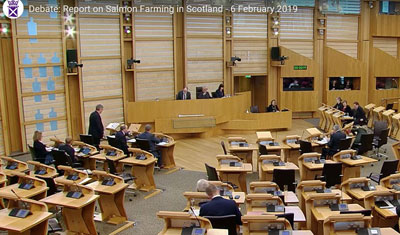 It’s apparent that a period of sea change in Scottish salmon farming is approaching, with several Scottish Government working groups examining it in close detail and a recent debate in the Scottish Parliament. Cynics (and they are in plentiful supply) will say this is another delaying tactic, however in the relatively young industry it could be seen as a natural progress, with regulators and legislators working to establish informed next steps now that it’s widely accepted and indisputable that ‘the status quo in terms of regulation and enforcement is not an option’[1].
It’s apparent that a period of sea change in Scottish salmon farming is approaching, with several Scottish Government working groups examining it in close detail and a recent debate in the Scottish Parliament. Cynics (and they are in plentiful supply) will say this is another delaying tactic, however in the relatively young industry it could be seen as a natural progress, with regulators and legislators working to establish informed next steps now that it’s widely accepted and indisputable that ‘the status quo in terms of regulation and enforcement is not an option’[1].
Fidra previously reported on the inquiry carried out by the Scottish Parliament’s Rural Economy and Connectivity (REC) committee[2], which followed an inquiry by the Environment, Climate Change and Land Reform (ECCLR) Committee and a petition submitted in 2016 by Salmon & Trout Conservation Scotland. The Scottish Government published a response to the REC Committee’s report[3] and it was subsequently debated by ministers in the Scottish Parliament, which Fidra attended[4].
Urgent
The overarching argument that came across at the debate was that in order to expand, the industry must tackle its current problems, with tighter regulation and enforcement as a driver. Indeed MSP Edward Mountain, convener of the REC committee, said that the Sottish salmon farming industry should not be allowed to expand until it can prove it’s a ‘good neighbour’.
He continued that ‘urgent and meaningful action needs to be taken’ to address regulatory deficiencies, with the regulatory tools available to SEPA being inadequate and ineffective. Talking about the location of salmon farms he said there needs to be a precautionary approach for applications to new sites and expansion of existing sites, and a need to locate new farms in more suitable sites away from wild salmon migratory routes. He added that a more strategic approach should be taken to identify areas across Scotland that are either suitable or unsuitable for location of salmon farms and work to move existing poorly sited farms to more suitable sites. He expressed concern that the Scottish Government’s response to the report says that ‘the precautionary principle has and will continue to be applied in a meaningful and effective manner’, as that was generally not what the committee heard in the evidence given during its inquiry. The report does not support ‘business as usual’ and that is not what the government or industry should be promoting.
Critical point
MSP Gillian Martin spoke next and said that while it is one of the lowest emission farming processes, ‘Scotland is at a critical point with salmon farming’ and has a ‘responsibility to protect biodiversity’. To that end she agreed that ‘current regulatory measures are insufficient’.
Fergus Ewing, Cabinet Secretary for Rural Economy and MSP, replied on behalf of the Scottish Government. He agreed on the ‘need to do more to protect the environment’ and that ‘the status quo is not an option’ but stressed the importance to rural economies with the provision of 10,340 jobs, £540 million Gross Value Added, wages worth £271 million and £600 million of sales abroad to more than 50 countries [5]. Describing present action from the current Scottish Government’s Farmed Fish Health Framework, he stated that the issues of mortalities and sea lice were key workstreams, with a review due in spring 2019 on the sea lice compliance regime, which he predicted would be subsequently tightened. In response to a question from John Finnie MSP on mortalities he said that interim steps were being taken to deliver an environmental monitoring plan as a condition for any consents for new farms.
MSP Donald Cameron from the ECCLR Committee spoke next and stated that the ‘industry has to improve and knows it has to improve’, having ‘undoubtedly’ had an effect on the decline in wild salmon and sea trout.
Look to Norway
John Finnie MSP commented that he was neither for nor against fish farms but ‘likes things to be in the right place’ and with the ‘right standards’. Referring to the report’s Recommendation 3 that stated there was insufficient evidence to support a moratorium on new salmon farms and expansion of existing sites, he said that he and MSP Colin Smyth dissented from this view in a rare break from consensus on the REC committee. He continued that while the Scottish Government applied precautionary principle as far as Fergus Ewing is concerned, ‘if it is genuinely being applied why would there not be a moratorium until the problems are resolved?’ He finished by stating that there is a need for ‘more urgency into this debate’ and there should be a moratorium pending the resolution of the issues.
Several MSPs emphasised the ‘need for more effective regulation’ and ‘streamlined planning’. Mike Drummond MSP referred to Recommendation 59 of the report which follows on from the statement that the ‘light touch approach to regulation hasn’t worked’, and tasks Marine Scotland with taking responsibility and an overarching role. Alex Rowley MSP agreed that ‘industry has shown it cannot self-regulate’ and suggests that Scottish Government commits to closed containment. Claudia Beamish MSP similarly called for urgent research into closed containment. Mark Ruskell MSP stated that Scotland is lagging by failing to adopt a Nordic approach of competitive licensing, and needs regulation that will drive high quality by making industry innovate. According to MSP Jamie Greene, for the Scottish salmon to be world leading it needs to consider closed containment, offshore sites, moving and closing sites and the use of a ‘traffic light’ regulatory system like Norway.
Next steps
In the closing speeches, Colin Smyth MSP stated that ‘Government must ensure the recommendations of the reports from the two inquiries are delivered’ and Peter Chapman MSP agreed with Mike Rumbles MSP that having ‘no single body responsible for regulating industry is a huge failing.’ It now remains for to be seen how the shortfalls in regulation and legislation are going to be addressed in practice.
[1] https://digitalpublications.parliament.scot/Committees/Report/REC/2018/11/27/Salmon-farming-in-Scotland#Summary-of-conclusions-and-recommendations
[2] https://www.bestfishes.org.uk/blog/
[3] https://www.parliament.scot/S5_Rural/20190129_Cab_Sec_RE_-_SG_response_to_Cttee_report_on_salmon_farming_in_Scotland.pdf
[5] https://www.hie.co.uk/media/2986/salmonplusfarmingplusinplusscotlandplus-plusjanplus2019.pdf
Tags: aquaculture, best fishes, fish farm, REC Comittee, salmon, salmon farming, Scotland, Scottish, Scottish Government, Scottish Parliament, Scottish salmon

